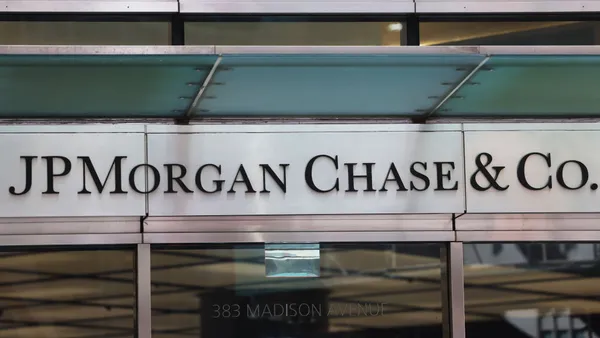Dive Brief:
- London-based NatWest could face a fine of up to £340 million ($463 million) after it pleaded guilty Thursday to three charges failing to comply with money laundering regulations between 2012 and 2016.
- The case marks the U.K. Financial Conduct Authority’s first criminal prosecution under 2007 anti-money laundering rules — and the first against a bank.
- A judge will determine the exact amount of the penalty in December, when the bank is sentenced. NatWest’s cooperation and guilty plea could reduce the fine. The bank said in a statement it intends to set aside a provision for the fine in its third-quarter earnings, set to be released Oct. 29.
Dive Insight:
The FCA alleged NatWest insufficiently monitored activity by jewelry wholesaler Fowler Oldfield, which deposited £365 million in the bank between 2011, when it became a customer, and 2016, when the business was shut down after a 2016 police raid uncovered what was called "an extremely sophisticated" money laundering operation.
When it opened the Fowler Oldfield account, NatWest agreed it wouldn’t handle cash deposits, Clare Montgomery, a lawyer representing the FCA, told the court. But at one point, she added, the gold dealer was depositing up to £1.8 million per day at a local branch.
"We deeply regret that NatWest failed to adequately monitor and therefore prevent money laundering," CEO Alison Rose said in a statement, according to the Financial Times. "NatWest has a vital part to play in detecting and preventing financial crime and we take extremely seriously our responsibility."
To that end, NatWest said it has invested nearly £700 million since 2016 to upgrade its transaction monitoring systems, automated customer screening and client due diligence, and planned to spend £1 billion more by 2026. The bank counts more than 5,000 anti-financial crime employees, it said.
The FCA has said it would not take action against any individual NatWest employee — current or former — in connection with the investigation that began in 2017, Bloomberg reported.
"We have often been criticized for acting slowly or with too much risk aversion. This is changing," the FCA’s CEO, Nikhil Rathi, said last month, according to the wire service. "We are applying a bolder risk appetite in dealing with serious misconduct. … In the future we will be a regulator that tests our powers to their limits, to ensure market integrity."












